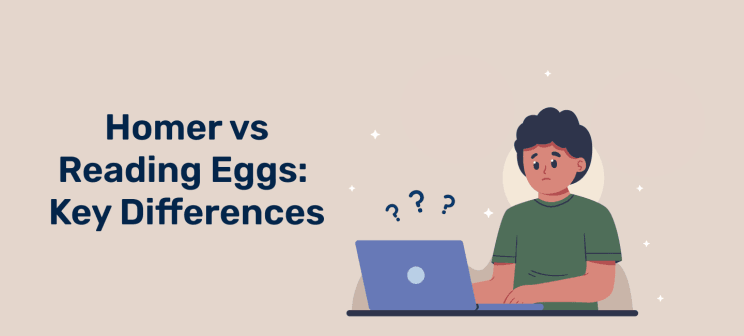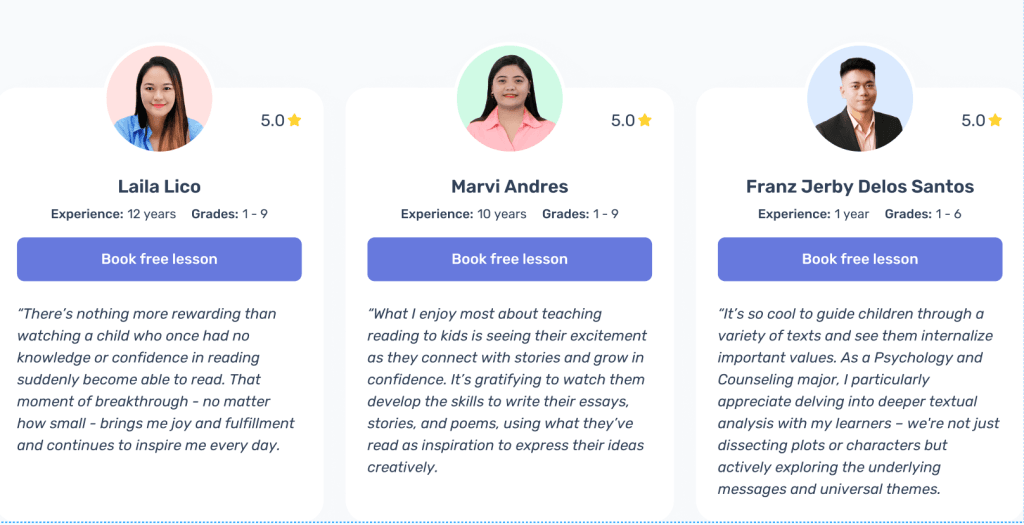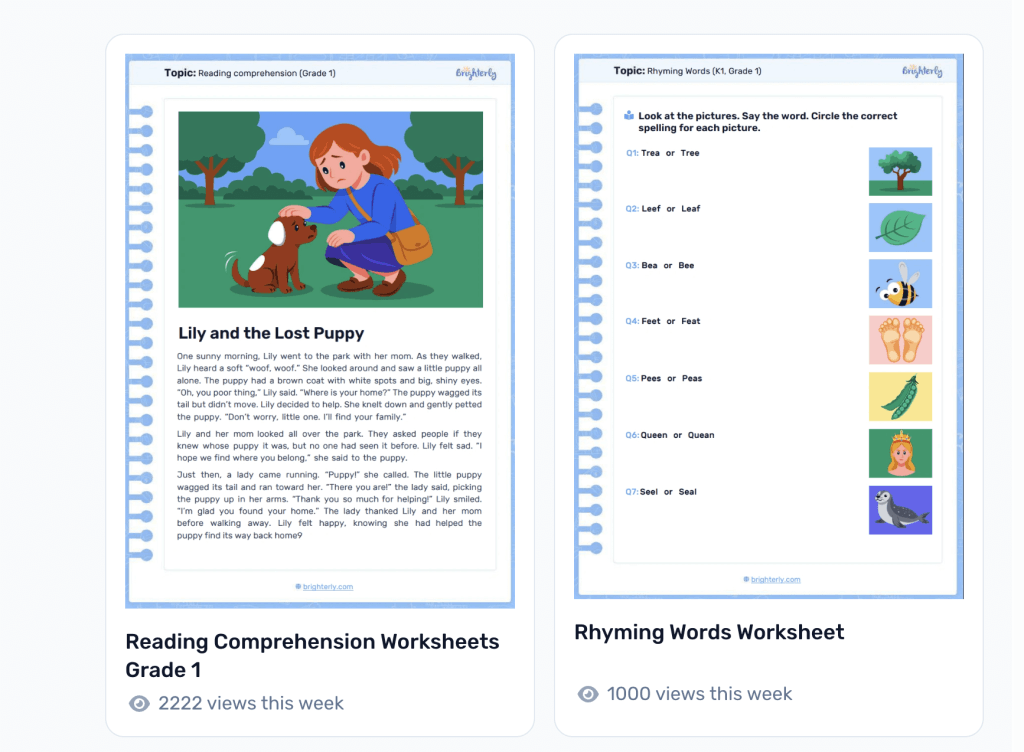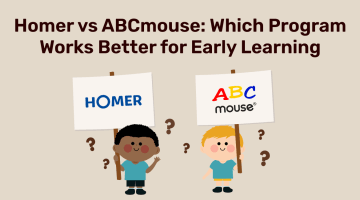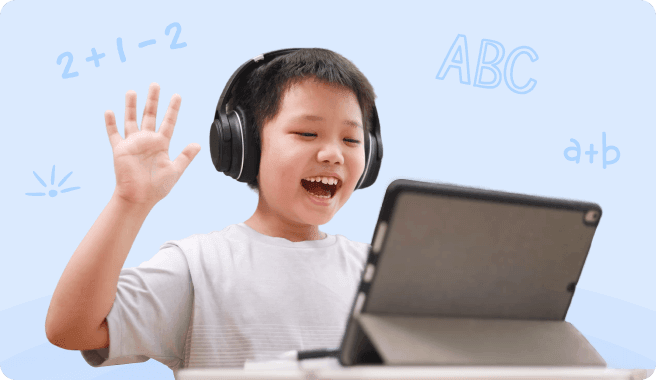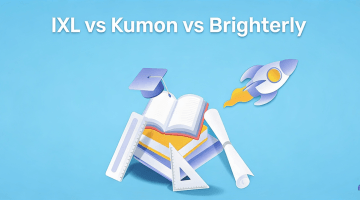Homer vs Reading Eggs: Key Differences in 2026
reviewed by Jo-ann Caballes
Updated on January 25, 2026
Once upon a time, reading meant turning pages. Now, it means tapping screens. Yet, amid the noise of notifications, a quiet revolution is happening. Reading apps are reimagining how today’s children develop reading skills. I tested two of the most popular platforms, Homer vs Reading Eggs, and analyzed them from a teacher’s perspective, and here’s how they stack up.
Key Points
- Homer and Reading Eggs offer very similar programs for children in pre-K through elementary school. Both include lessons in letters, phonics, stories, and early numeracy, covering all essential skills.
- Homer’s main advantages are its single, easy-to-use app with a modern design and a superior focus on phonics. Reading Eggs, on the other hand, offers a broader variety of read-aloud stories.
- In terms of cost, Reading Eggs is a bit more affordable short-term at $9.99/month or $69.99/year, while Homer costs $12.99/month or $79.99/year for full access.
- The main drawback of both apps is that, without supervision, children can easily end up spending more time replaying the same games or videos rather than learning.
- For parents seeking a solution, Brighterly stands out as a solid alternative, offering live 1-on-1 tutoring that ensures children spend their learning time effectively.
Exploring alternatives?
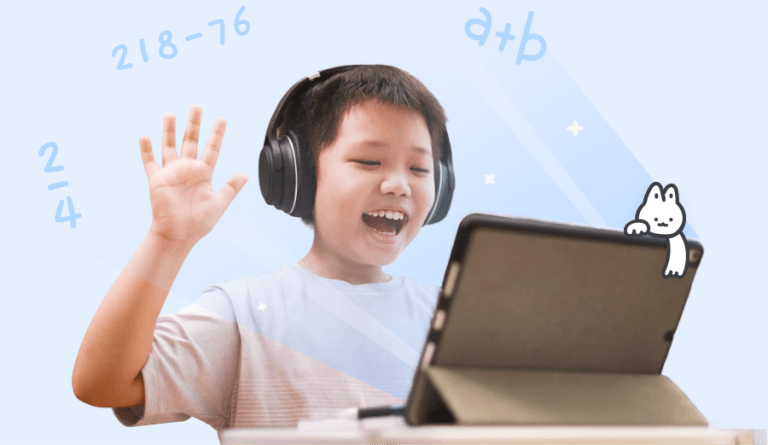
Reading Eggs vs Homer: Comparison
The main difference between Homer and Reading Apps lies in the structure of their learning content and the design of their materials. Homer offers a unified modern app, while Reading Eggs distributes its lessons across multiple apps, which look slightly outdated.
Both programs share many similarities and the same goal of developing early reading skills. Both Reading Eggs and Homer target children of preschool and elementary school ages, with Reading Eggs offering a slightly broader range for learners up to 13 years. As described below, both platforms provide a solid mix of phonics, vocabulary, and math lessons. The key comparison points can be summarized as follows:
Platform Comparison: Homer vs Reading Eggs
Homer |
Reading Eggs |
|
Age group |
2-8 years | 2-13 years |
Focus areas |
Reading, math, social-emotional learning, creativity | Reading, phonics, spelling, vocabulary, grammar, math (via Mathseeds) |
Learning approach |
More personalized, play-driven | Structured, with leveled lessons |
Free trial |
30-day free trial | 30-day free trial |
Progress tracking |
Regular email updates and detailed reports | Automated progress reports |
App structure |
Single, unified app for all subjects | Multiple apps for different subjects |
Offline resources |
Printable worksheets | Printable worksheets and activities |
Reading Eggs vs Homer cost
When it comes to cost, Reading Eggs and Homer are surprisingly close.
- Reading Eggs’ standard subscription starts at $9.99 per month for access to its reading programs, while the annual plan costs – $69.99 per year. Moreover, parents who want to add math lessons can opt for a combined plan at $13.99 per month.
- In contrast, Homer keeps things simpler, offering a single $12.99 monthly plan or an annual subscription for $79.99. Both Reading Eggs and Homer allow up to four child profiles, and include a free trial, letting families test before they commit.
All in all, Homer vs Reading Eggs cost the same each month, but Homer wins on price if you choose the annual plan.
Reading Eggs vs Homer: Cost сomparison (2026)
Homer |
Reading Eggs |
|
Monthly plan |
$12.99 / month | $9.99 / month |
Annual plan |
$79.99 / year ≈ $6.66 / month |
$69.99 / year ≈ $5.83 / month |
Combined reading + Maths plan |
Not offered (reading-focused only) | $13.99 / month |
Free trial |
Yes (30 days) | Yes (30 days) |
Child profiles included |
Up to 4 | Up to 4 |
Supported platforms |
Web, iOS, Android, Windows, Mac | Web, iOS, Android, Windows, Mac |
Brighterly: Smarter alternative for personalized learning
When comparing Homer and Reading Eggs, one key limitation stands out: neither of these platforms offers live instruction. Brighterly reading program, in contrast, provides personalized sessions with experienced tutors who design learning plans on an individual basis. Because each session involves just the child and the tutor, the quality and focus of learning are much higher.
Brighterly: Main features for students
Experienced tutors
The Brighterly math and reading platform works exclusively with certified and carefully selected reading tutors, which is a major advantage. These educators are trained to support children who struggle or need extra encouragement.
Free sample materials
In addition, unlike resources available at Homer vs Reading Eggs, the Brighterly website offers a wealth of helpful resources, such as reading worksheets and articles. There are also reading tests that parents can use at home to check their child’s progress and understanding.
Effective progress tracking and alignment with U.S. educational standards
Brighterly supports both children and parents at every step. Parents receive clear progress reports showing what their child has mastered, practical home tips, and access to helpful resources online. This structured approach makes learning effective and stress-free for the whole family.
Finally, Brighterly’s curriculum is also aligned with U.S. education standards, so you can be sure your child is learning the right skills for their grade level and academic requirements.
What is the Brighterly price?
Because it’s live tutoring rather than pre-made content, Brighterly is more expensive than Reading Eggs vs Homer. Still, it does offer a complimentary demo lesson along with a wide range of free math and reading resources. The longer the subscription plan, the lower the cost per lesson. Below is an overview of Brighterly’s pricing plans:
- 12-month plan: $17.30 per lesson
- 6-month plan: $19.40 per lesson
- 3-month plan: $20.20 per lesson
- Monthly plan: $20.70 per lesson
What is Homer reading best at?
Superior phonemic learning
Homer was developed with phonics in mind and excels at teaching the basics of reading. Homer resources show first how to spell sounds properly rather than expecting that a child will learn it intuitively. Children blend sounds into words, listen to a word and segment the individual sounds, and identify the first sound of words.
Balanced interaction and simplicity
What parents particularly like about Homer is that it is very intuitive yet interactive and engaging. Of these two: Reading Eggs vs Homer, the latter is more child-friendly and easier for independent use. Thanks to its well-designed interface, many children indeed enjoy spending time on Homer, often choosing it over cartoons or mobile games.
Broad range of content
Homer goes beyond the reading – it also offers basic math, creativity, thinking, and social and emotional learning. Children can combine core reading lessons with learning about feelings, shapes, practicing numbers in songs, etc. Thus, parents enjoy having all of this pre-school and elementary school content in one place.
How does the Homer reading work?
Homer is a modern interactive platform that uses the four-step “Homer method” – introduce, practice, apply, and transfer – to help children build and retain reading skills. It’s also said to be based on a proven body of research on how children best learn to read.
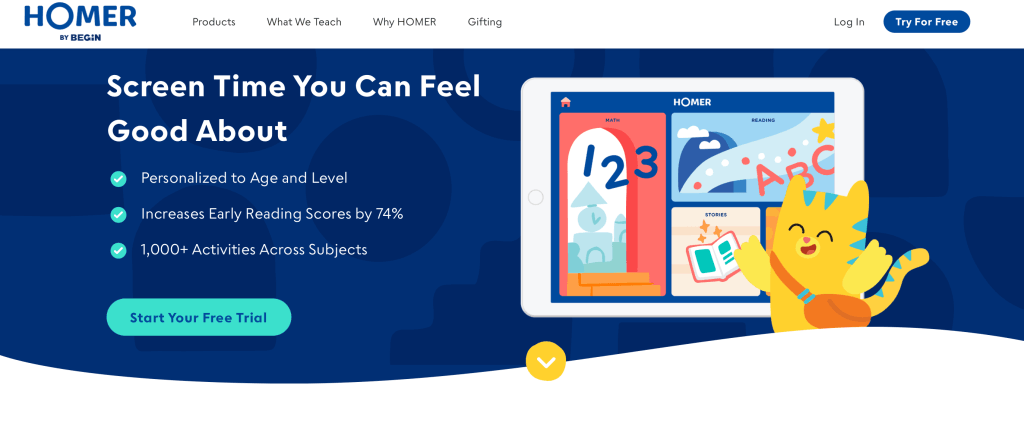
As such, with Homer, children follow a set path that starts with the introduction of a letter sound and its corresponding letter and moves step-by-step toward reading and spelling words using the targeted sound together with sounds a child has already mastered. It can be concluded that learning with Homer largely relies on phonemic teaching and awareness. Furthermore, the website praises classic children’s literature, featuring stories written by notable authors such as Ernest Hemingway and Mark Twain, among others.
What is the Homer reading price?
The monthly Homer reading price is about $12.99, while the annual subscription costs $79.99, which works out to about $6.66 per month. Each subscription allows for multiple child profiles and includes a free trial, letting families explore the app and assess its value before committing.
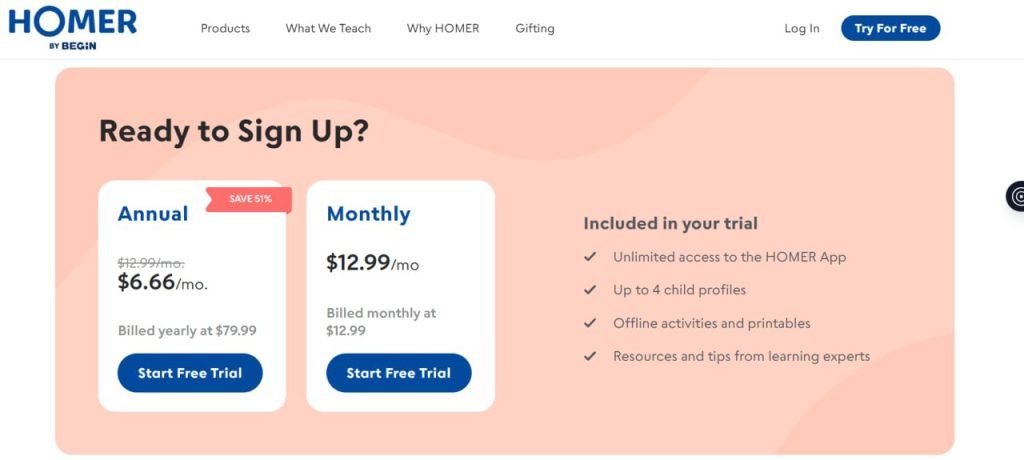
What is Reading Eggs best at?
Large library
One of Reading Eggs’ most appealing features is its rich library of 250+ leveled read-aloud e-books and animated stories. The platform’s video catalogue offers hundreds of animated and real-life videos.
Free printables
Reading Eggs offers a good selection of free printable worksheets and sample lessons. On the website, parents and children can explore simple stories together, complete memory challenges, or solve jigsaw puzzles. Even without paying, families can try these activities and see how well their children understand the material.
Wide curriculum and adaptability
Just like our former discussion point in the Homer vs Reading Eggs, the platform goes beyond basic phonics and covers spelling, vocabulary, grammar, and reading comprehension. The learning blocks cover foundational reading skills, including learning colors and counting, developing listening skills and memory, etc.
How does Reading Eggs work?
Reading Eggs teaches young children essential pre-school knowledge through gamified cartoon-like content. When a child starts, the program runs a quick placement test to assess their reading levels and automatically places them on the right path.
Early lessons are structured around phonics, sight words, and comprehension, then move from simple sounds and letters to full sentences and stories.
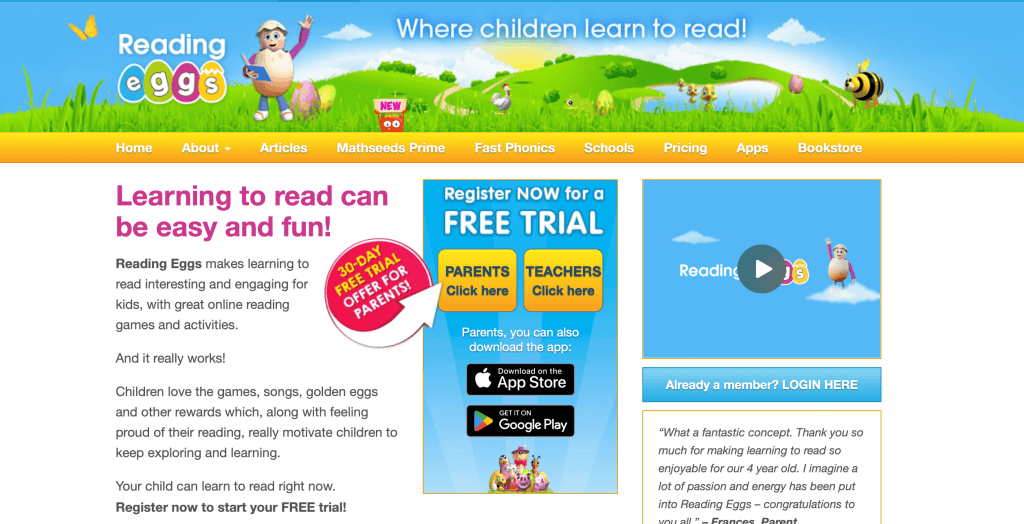
Each completed activity unlocks rewards such as golden eggs, characters, or new storybooks. So, this site is more successful in boosting motivation in the Reading Eggs vs Homer combo.
The platform also provides parents with a dashboard to track progress or identify areas where their child might need extra parent support.
Note: However, unlike all-in-one platforms, Reading Eggs uses several separate apps, such as Reading Eggs, Reading Eggspress, and Mathseeds, each focused on different skills. It feels a bit inconvenient to switch between them.
What is the Reading Eggs cost?
The monthly Reading Eggs cost is about $9.99 for all reading programs, while the annual plan is $69.99, saving roughly 40% compared to monthly billing. Families can also choose a bundle that includes both Reading Eggs and Mathseeds for $13.99 per month or $99.99 per year.
Each subscription covers up to four children and includes a 30-day free trial, making it a cost-effective choice for multi-child households. Full description on how much is Reading Eggs is shown in the blog article Reading Eggs cost 2026.
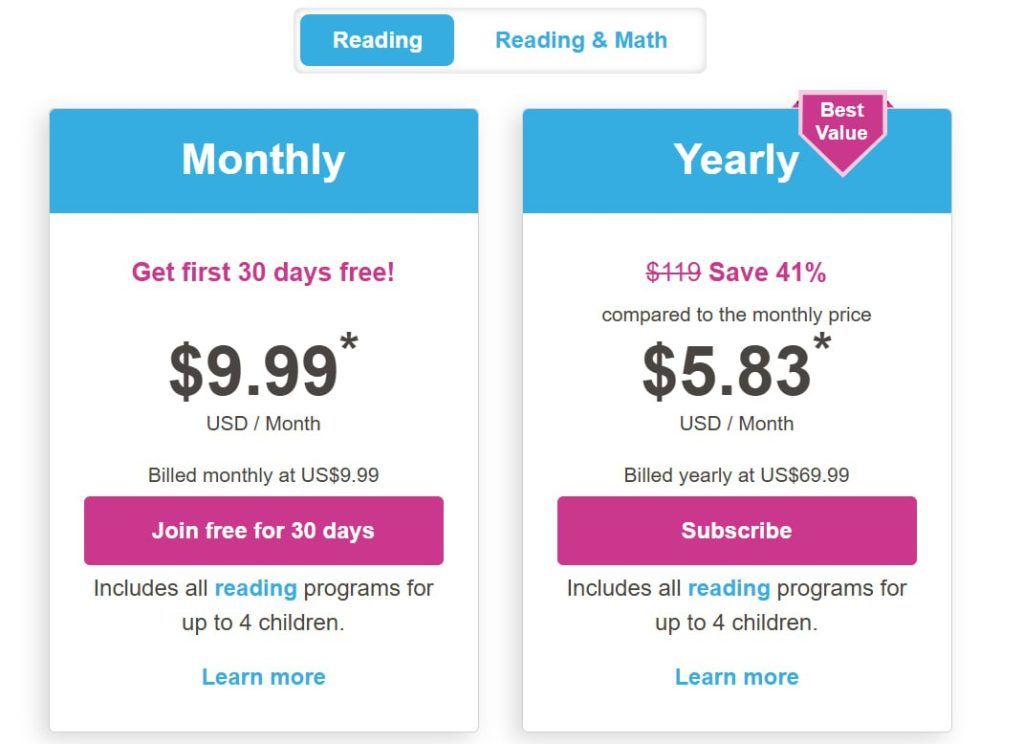
Homer vs Reading Eggs Reddit & Trustpilot reviews
Let’s turn to the best judges of all, parents, and see what they have to say about both programs. On Trustpilot, Homer has been reviewed over 300 times, earning an average rating of 3.4, with about 50% of users giving it the top 5-star award. Reading Eggs, in contrast, has only 22 reviews and an average rating of 3.2, with nearly 40% of reviewers awarding it just 1 star.
On the App Store, however, the picture looks more favorable for both platforms. Reading Eggs scores a high 4.7 stars, from around 5,600 reviews among iPhone and iPad users. Homer holds a slightly lower 4.4-star average, yet this rating comes from a much larger pool of over 25,000 reviews. Next, I will present some representative Homer vs Reading Eggs review samples.
Homer reading app reviews
On Trustpilot, Homer clients often praise its slim, smooth, and pleasant design. Kids enjoy spending time with this app and usually make quick progress.
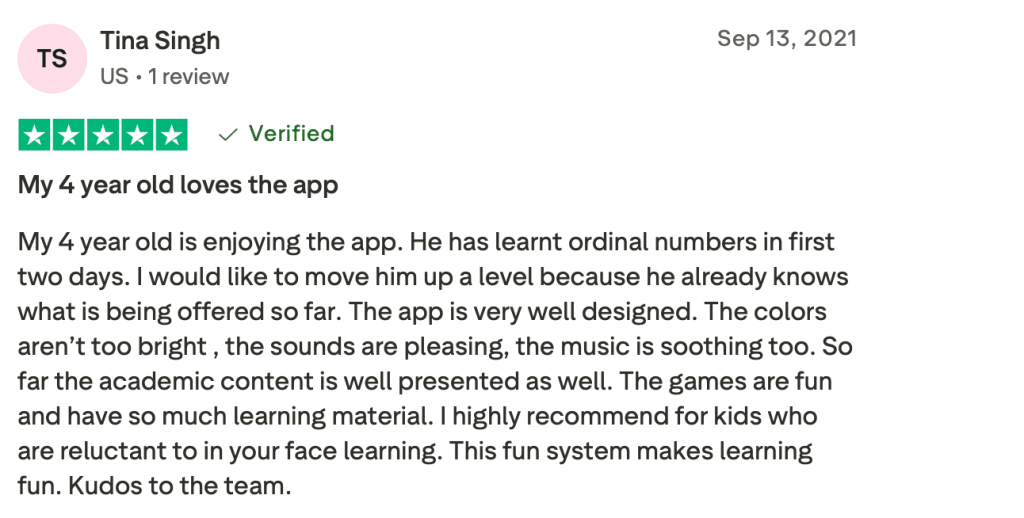
On the other hand, on Trustpilot, I could find complaints about certain content, such as stories with Frankenstein, and the fact that children still prefer clicking videos rather than solving tasks. That’s understandable, and it means that parents need to take control of how their child is doing, rather than blindly relying on a magical app.
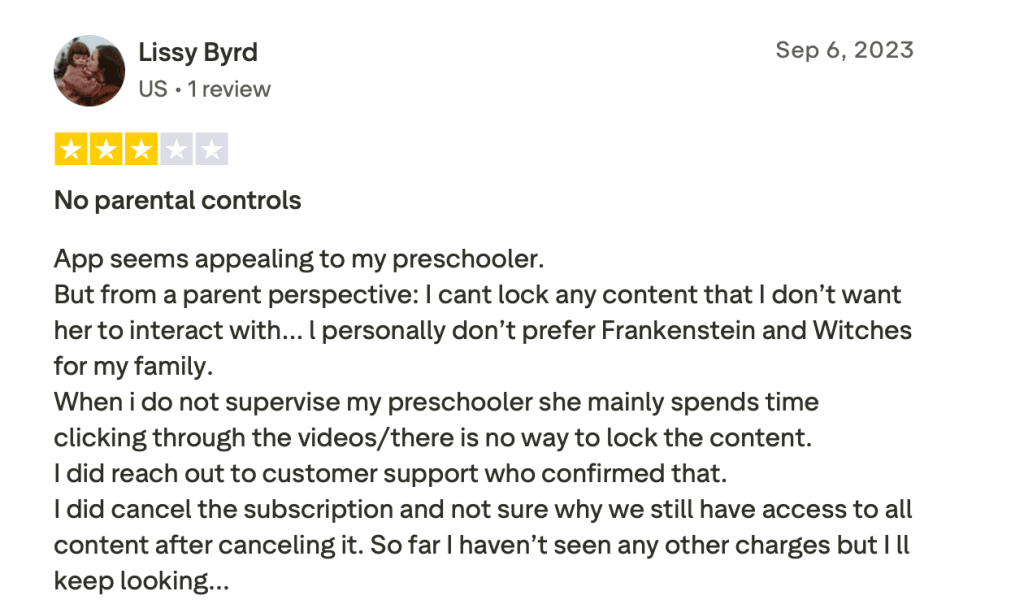
Some Reddit customers complained about poor customer service and the refund policy.
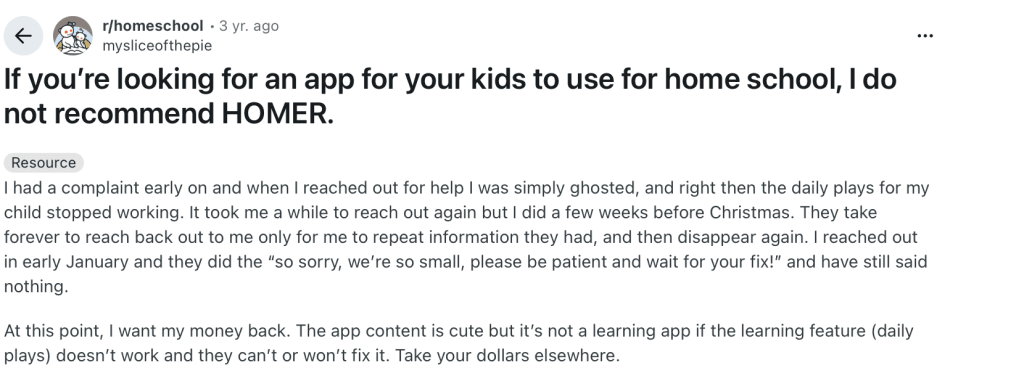
In contrast, Brighterly addresses this challenge by offering one-on-one lessons with a dedicated tutor. This ensures a healthy balance between interactive play and focused instruction.
Reading Eggs review
Users of Reading Eggs on Trustpilot also recognize its efficiency, citing the progress of their children and the interesting gamified content.
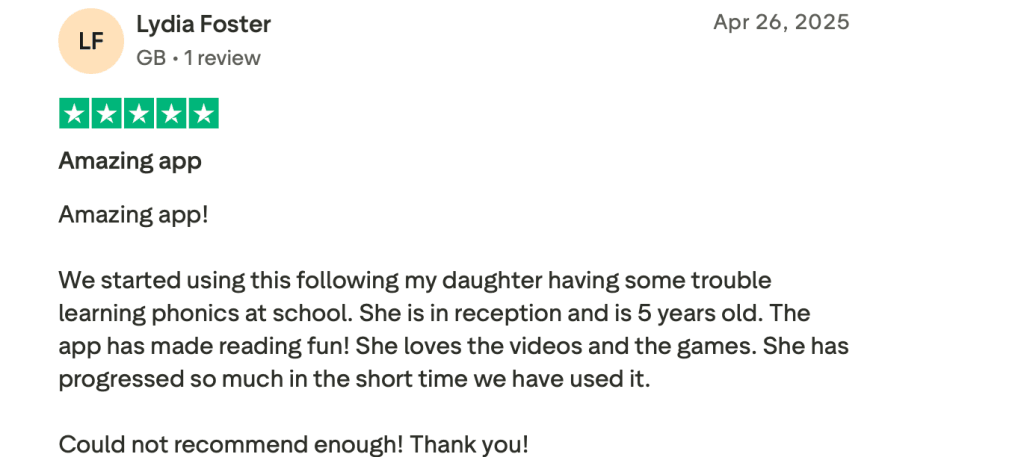
Meanwhile, there are complaints that kids also focus too much on games inside the app that aren’t informative enough, but rather keep a child engaged in the app without really teaching. So, again, parents need to control how the child spends time inside the app.
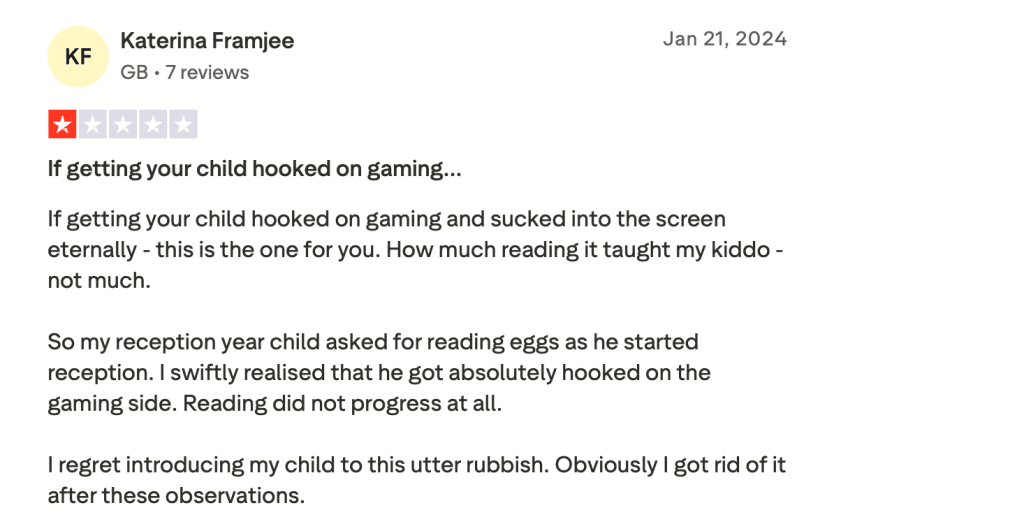
Reddit customers also raised this issue, saying that the app by itself is not informative, and further parental explanations are necessary for children’s comprehension. There is also a dedicated article on Reading Eggs reviews that you can check.

Brighterly, on the other hand, eliminates this gap with its tutoring, where a teacher explains concepts, answers questions, and adapts lessons to the child’s understanding in real time. This approach also saves parents time, as they can simply review the tutor’s feedback and stay informed about their child’s progress.
What’s the main difference between Homer Reading vs Reading Eggs?
The major difference between Reading Eggs vs Homer is Homer’s strong focus on explicit phonics instruction. Additionally, Homer delivers all lessons within a single, unified app. Instead, Reading Eggs has a fragmented structure, with different learning modules that must be downloaded separately.
While both programs share many similarities and the same goal of developing early reading skills, I’d choose Homer as the superior option.
- First, Homer feels modern and visually appealing, a 2020s design, whereas Reading Eggs has a somewhat outdated 2000s version look.
- Additionally, Homer delivers all lessons within a single, easy-to-use app, in contrast to Reading Eggs’ lessons that are spread across multiple modules.
- Finally, Homer just seems generally more educational and pleasant.
That said, Reading Eggs reviews give it credit for its vast collection of books on topics like inventions, the cosmos, and Vikings.
Which is better: Homer vs Reading Eggs?
To conclude, if you care about structured lessons, modern design, and an all-in-one app learning experience, then Homer is the winning choice.
If you opt for a wide variety of reading materials to keep your child exploring different topics, then Reading Eggs might suit you more.
However, if you are looking for tailored 1-on-1 lessons, structured progress tracking, and combined math and reading tutoring, Brighterly could be the perfect fit. Give your child the chance to excel – Book free reading lesson today!
Other platforms comparison
If you’re still unsure which program is right for your child, check out the best reading program for kids or these comparison articles. They cover all the pros, cons, and potential pitfalls of each platform in detail:

